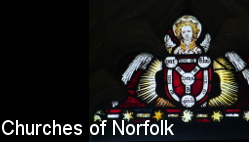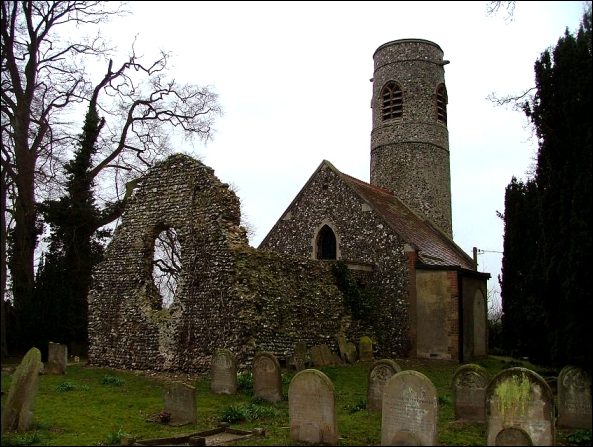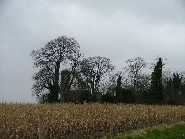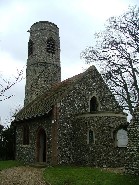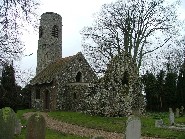| |
|
All
Saints, Keswick
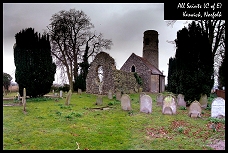 |
|
Here
we are on the frayed outer edge of south Norwich,
but this little church feels as remote as any in
East Anglia, especially when a sky the colour of
lead has come down to almost meet the soft land.
As it would turn out, this would be just about
the only dull, grey day in a March full of sunny
weather, but it strangely suited this part-ruin
on top of a hill, a few hundred metres from the
nearest road. No doubt it is down to those
cunning people at the Norfolk County Council
planning department, but you don't have to get
far from the city to feel in the middle of
nowhere. There isn't really a village to
speak of, and the parish is a joint one with
neighbouring Intwood, so you might think it very
obscure. But later, I mentioned my visit to an
Anglican clergyman friend of mine in Ipswich, and
he had fond memories of the place, because
Keswick Hall was where many East Anglian clergy
trained for the Priesthood when it was a
theological college.
|
Keswick
Hall had been the home of a less famous branch of the
Gurney family, and it is them we have to thank for this
church. As so often in Norfolk, the 16th century change
from Catholic sacramental worship to Anglican
congregational worship meant that Norfolk had far more
churches than it could possibly ever need, and All Saints
fell into disuse. In 1598, Henry Hobart, on his way to
building Blickling Hall, bought the manors of Keswick and
Intwood. Installed at handsome Intwood Hall, he rebuilt
the church there with materials from Keswick. Then, a
full three hundred years later, The Gurney family
restored the ruin of All Saints as their mortuary chapel.
By the 1920s, perhaps as a result of the post-WWI triumph
of Anglicanism, the chapel was refurbished and
reintroduced as a church, almost four hundred years after
last seeing service as one.
Externally,
you can see that this has always been a tiny church.
Until the 1890s, the east side of the round tower was a
gaping hole looking out onto the shell of the chancel.
The Gurneys built their new church against the tower, and
it is no more than six metres long. In the 1950s, a
rounded apse was added, and the Keswick war memorial
reset on the outside of it.
You step
into a delightful, tiny space, the hole in the tower
filled with red brick to form a new archway. Benches
accentuate the fact that the nave is slightly wider than
it is long, and above the 1950s apse is a window
depicting Hope by the William Morris workshop. In the
literature, nobody seems to have a kind word to say about
this window, but I thought it was rather good.
| There
is a pleasing devotional feel to the interior,
angels which may originally have been intended
for riddell posts flanking the tiny sanctuary,
red and gold used to good effect. The angels in
the roof look as if they are restored medieval
ones. I wonder where they came from? As for the
font, I have never seen anything quite like it. I
couldn't decide if it looked more as if it had
come from an Ancient Greek temple or a garden
centre. But being unusual it suits this tiny
space, which is quite unlike any other. Keswick may
not be the smallest medieval church in Norfolk -
I think Santon may take that prize - but Santon
is redundant, and Keswick is surely the smallest
Anglican church still in use in East Anglia. And
such a delight.
|
|
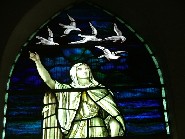 |
|
|
|
